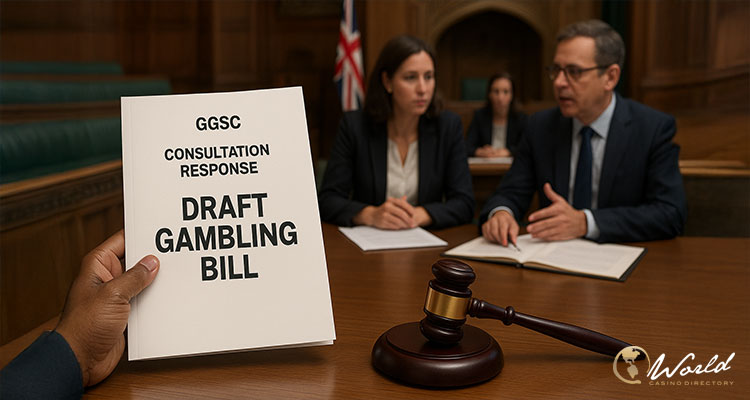The Isle of Man Gambling Supervision Commission (GSC) has confirmed it will move forward with its draft Gambling Supervision Commission Bill after completing a public consultation that attracted a range of responses from licensed operators, service providers, and other stakeholders. The proposed legislation seeks to modernise the island’s gambling regulatory framework by consolidating existing laws and strengthening oversight mechanisms across all relevant acts.
Broad Support With Calls for Refinement
In its recently released consultation response document (pdf), the GSC said feedback on the draft bill was largely positive, with respondents recognising the benefits of harmonising inspection, investigation, and enforcement tools across multiple pieces of gambling legislation. The reforms aim to align the GSC’s regulatory powers with the island’s evolving risk profile and recent National Risk publications.
Fifteen written submissions were received from industry stakeholders, including legal professionals and licensees, offering both technical and operational perspectives. Many supported the standardisation of procedures under acts such as the Online Gambling Regulation Act 2001, Gambling Supervision Act 2010, and Gambling (Anti-Money Laundering and Countering the Financing of Terrorism) Act 2018. However, several respondents questioned the extent of certain investigatory powers—particularly those involving access to data from unlicensed suppliers or individuals no longer connected to Isle of Man operations.
The GSC clarified in its release that these powers are investigatory only and do not impose continuing obligations on unlicensed entities. It emphasised that safeguards are built into the framework, including proportionality tests, judicial oversight, and respect for privacy and data protection laws.
Another key area of feedback concerned proposed updates to definitions of “associate,”“controller,”“beneficial owner,” and “senior manager.” Some stakeholders argued that the scope of “associate” was overly broad, potentially encompassing family members or informal relationships. The GSC responded that these definitions are essential to detect hidden influence or control within licensees, though it pledged to apply a risk-based approach when requesting information.
On ownership thresholds, responses were divided between setting the level of control at 5% or 25%. The GSC confirmed it will retain its existing thresholds—5% for private companies and 20% for public ones—while maintaining flexibility to modify these via secondary legislation in the future.
The consultation also explored revisions to the 2018 Anti-Money Laundering Act. Respondents offered mixed views on the proposal to impose civil penalties on key persons and senior managers. Some welcomed the move as a way to strengthen accountability, while others expressed concern it might discourage compliance professionals from taking senior positions. The GSC assured respondents that enforcement would remain proportionate and that penalties would only follow formal investigations. It also confirmed that deputy money laundering reporting officers will be included in the definition of “key person” to ensure alignment with existing AML/CFT codes.
Industry Concerns and GSC’s Next Steps
Further discussion arose around removing section 5(3)(h) of the Gambling Supervision Act 2010, which required the regulator to consider the “desirability of facilitating industry development.” Some argued that eliminating this clause could reduce the island’s competitiveness. The GSC countered that market promotion falls under the Department for Enterprise, while its own duty is to preserve the integrity of the Isle of Man’s regulatory framework.
Stakeholders also addressed consumer protection and data-sharing powers. Many welcomed stronger safeguards but sought clarity on how collected data would be managed. The GSC reiterated that legal privilege, confidentiality, and data protection rules remain in full effect, and that any requests must be “proportionate and targeted.”
Feedback regarding proposed fitness and propriety assessments under the Online Gambling Regulation Act 2001 was largely supportive, with licensees appreciating efforts to clarify suitability criteria. The GSC confirmed plans to issue public guidance to enhance transparency and understanding of expectations.
Other respondents discussed potential impacts on dispute resolution and publication of enforcement outcomes. While some encouraged greater transparency, others cautioned that revealing detailed findings could harm reputations. The GSC said it would balance fairness with accountability, ensuring enforcement transparency without compromising privacy.
Following its review, the GSC confirmed it will proceed with the draft legislation substantially as consulted upon. The bill is scheduled to be presented before Tynwald in October, with enactment anticipated in 2026. The regulator said it will continue to engage with stakeholders through updates and drop-in sessions over the coming months.
In a statement accompanying the report, the GSC expressed gratitude for the constructive feedback and reaffirmed its commitment to maintaining a safe, fair, and competitive gambling environment. The reforms, it noted, are designed to strengthen oversight, enhance compliance consistency, and preserve the island’s reputation as a trusted global hub for regulated gaming.



